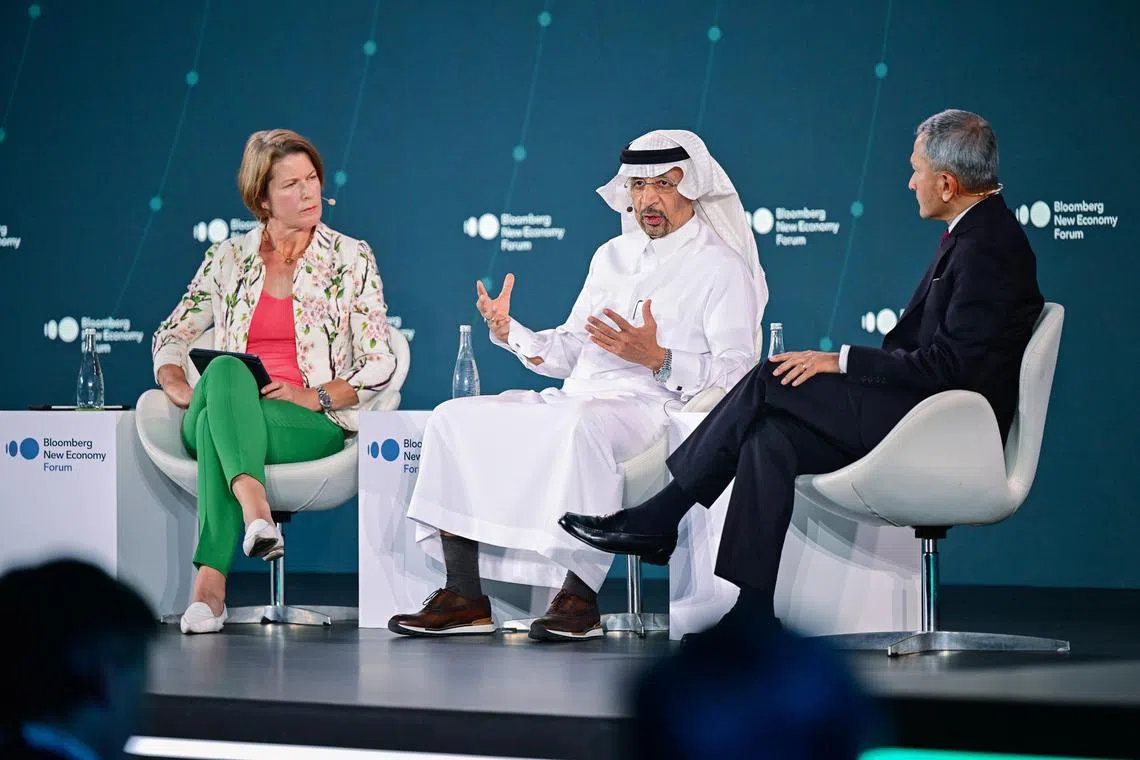Normalisation of ties with Israel contingent on Palestinian issue: Saudi minister
Sign up now: Get ST's newsletters delivered to your inbox

Saudi Arabia's investment minister Khalid Al-Falih (centre) and Foreign Minister Vivian Balakrishnan during a panel discussion at the Bloomberg New Economy Forum on Nov 8. Ms Stephanie Flanders, Bloomberg’s head of economics and government, moderated the session.
PHOTO: BLOOMBERG NEW ECONOMY FORUM
SINGAPORE – The normalisation of Saudi Arabia’s relations with Israel
Saudi Crown Prince Mohammed bin Salman was clear on this point during previous discussions on normalisation, said Mr Al-Falih, at the Bloomberg New Economy Forum at Capella Singapore hotel on Wednesday.
“The setback over the last month has clarified why Saudi Arabia was so adamant that a resolution to the Palestinian conflict has to be part of a broader normalisation in the Middle East,” he said.
The establishment of diplomatic relations between Saudi Arabia and Israel, brokered by the United States, would be a major milestone in Arab-Israeli relations.
In September, before the onset of the war, the Saudi crown prince had told US media outlet Fox News that “every day we get closer” to normalisation.
The war broke out on Oct 7
“The Palestinian people have had their basic rights taken away, and the right for statehood and peaceful existence unfulfilled, and it’s time to use this awful situation now to bring that to the fore and to resolve it,” Mr Al-Falih added.
Speaking at the same session, Singapore’s Foreign Minister Vivian Balakrishnan said the recent developments in the Gaza Strip illustrated that the Palestinian issue needs to be resolved “right up front”.
In the initial euphoria of the Abraham Accords,
The Abraham Accords, which the US helped to broker, are a series of normalisation agreements between Israel and Arab nations signed in 2020. Saudi Arabia is not among the signatories.
Dr Balakrishnan said that in his view, there was no viable alternative to the resolution of the Palestinian issue besides a two-state solution. But it was problematic that support for a two-state solution among both the Palestinian and Israeli people had been falling in recent decades.
“If you think carefully about it, one state must mean, by definition, the violent elimination of the other people,” he said.
“You need cool-headed people in the middle of the political milieu, on both the Palestinians and the Israeli side, to get together and say, look, how are we going to live and let live?”
Earlier in the week, Singapore’s Parliament unanimously condemned the violence
Speaking during a separate session at the forum, Mr Thomas R. Nides, the former US ambassador to Israel from December 2021 to July 2023, said in retrospect that it was a mistake the Palestinians were not part of the normalisation agreements.
Mr Al-Falih said Saudi Arabia is looking to work towards a peaceful resolution of the conflict by convening a series of summits in the coming days.
Riyadh will host an emergency Arab League summit on Saturday, and an Organisation of Islamic Cooperation extraordinary summit on Sunday.
It will also convene a summit with African nations, said Mr Al-Falih, without specifying a date. It was originally scheduled for Saturday.
He said that Saudi Arabia had, decades ago, put forward an Arab peace plan, which “saw a way forward for a normal Middle East” – wherein all countries had normal relationships and could focus on economic prosperity.
“We remain eager to see that plan come into fruition for a peaceful process,” he added.
In 2002, Saudi Arabia put forward a peace plan that was adopted as the Arab Peace Initiative at the Arab League Summit in Beirut that year.
In the initiative, Arab nations offered Israel normal ties in return for a statehood deal with the Palestinians and full Israeli withdrawal from territory captured in 1967.
Both Mr Al-Falih and Dr Balakrishnan were speaking during a panel discussion on “The Rise of Economic Statecraft” moderated by Ms Stephanie Flanders, Bloomberg’s head of economics and government.
Asked if Saudi Arabia would use economic tools such as the price of oil to achieve a ceasefire in the Gaza Strip, Mr Al-Falih replied: “That is not on the table today. Saudi Arabia is trying to find peace through peaceful discussions.”
Dr Balakrishnan pointed out that that situation today was very different from that in 1973, when Arab producers led by Saudi Arabia slapped an oil embargo on supporters of Israel in its war with Egypt, leading to an oil crisis.
“The United States is now a net energy exporter”, he said, “and you need to parse the implications of that”.


